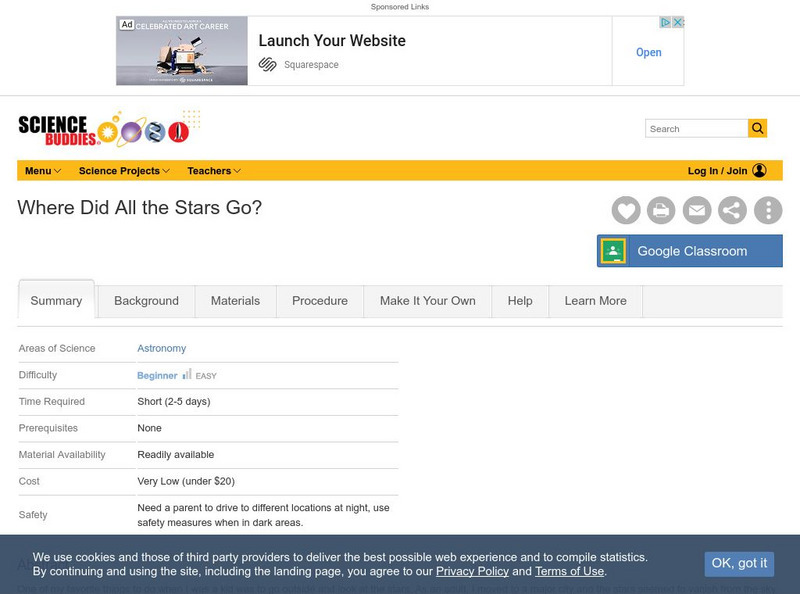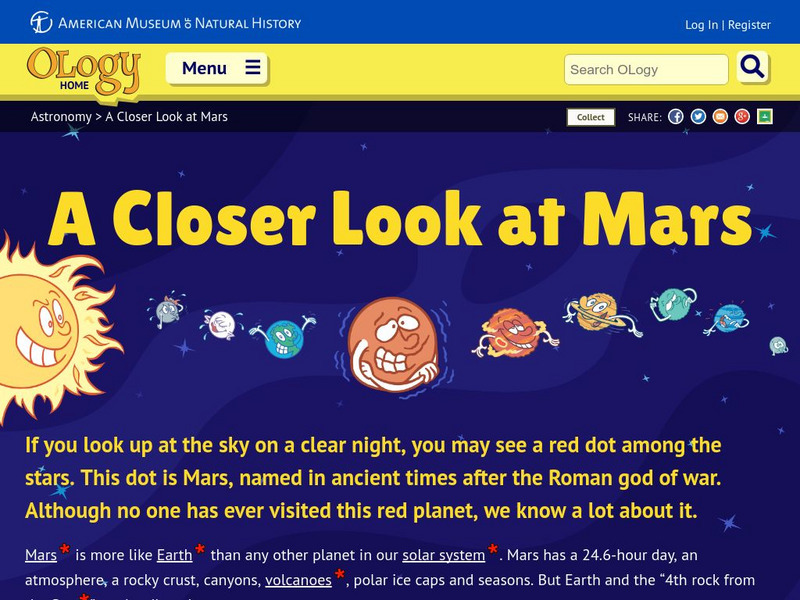Science Buddies
Science Buddies: Where Did All the Stars Go?
If you live in a big city or urban area it is hard to see many stars at night. In most urban areas only the most brilliant stars, planets and the moon can be seen. This is because of something called light pollution which is the...
Other
University of Leicester: The Solar System
Resource explores the solar system, with an in depth discussion of each of the planets and their properties.
Other
Montana State University: How Much Would You Weigh on Distant Planets?
This resource contains a lesson plan in which students study the effects of gravity on the planets of the Solar System. They will view movies from the lunar Apollo missions, calculate their own weight on other planets, and propose what...
NASA
Nasa Star Child: Jupiter the Largest Planet
Here at this site from NASA you can learn about the planet Jupiter! Read, or listen to, what makes Jupiter so special in our solar system.
NASA
Nasa Star Child:space Probes (Level 1)
This page of NASA's excellent Starchild site deals with Space Probes. Learn about the various planetary probes by clicking on the planet of interest.
Cosmos 4 kids
Cosmos4 Kids: Everything Gathers
Understand that smaller parts make up the larger parts of our solar system. See that gas and dust come together to form a star, small rocks and asteroids come together to form planets, and so on. This page is a reference page that...
Smithsonian Institution
Smithsonian Learning Lab: The Universe, an Introduction
Start with the questions all students ask: How big is the universe, how far away are the planets and stars, how did they form and when, how do they move and why? Build on their natural curiosity. The Smithsonian, in cooperation with...
Cool Math
Coolmath: Science Monster: Our Sun
Find out about our closest star, the sun. Read interesting facts and other trivia about our planet's source of energy.
NASA
Nasa Space Place: What Is an Exoplanet?
Defines exoplanets and explains how astronomers go about looking for them.
BBC
Bb Ci Space: Solar System
Take a journey through the solar system with this interactive guide. Includes planetary history, "travel information," "tourist highlights," and video clips. Games and quizzes include a Solar System jigsaw that prompts the student to...
American Museum of Natural History
American Museum of Natural History: O Logy: A Closer Look at Mars
If you look up at the sky on a clear night, you may see a red dot among the stars. This dot is Mars, named in ancient times after the Roman god of war. Although no one has ever visited this red planet, we know a lot about it. This site...
NASA
Nasa: Space Place: Where Does Interstellar Space Begin?
Find out about interstellar space, and what characterizes this part of space outside of the heliosphere.
Other popular searches
- Space, Stars and Planets
- The Stars and Planets
- Stars and Planets Worksheets
- Compare Stars and Planets
- Stars and Planets Puzzles
- Space Stars and Planets
- Space\, Stars and Planets
- Planets and Stars
- Comparing Planets and Stars
- Space\\, Stars and Planets
- Planets Stars









